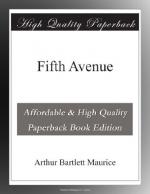Then, quietly at first, but none the less surely, Fifth Avenue began to play its part to the town and to the visiting stranger. Now that the Astor House and the old Fifth Avenue Hotel are gone it is to the Brevoort, or the Lafayette-Brevoort, just as you choose to call it, that one turns to find the ghosts of yesterday. They are nothing to shy at, being comfortable, well-fed spirits, compositely cosmopolitan. For legend has it that the management in the old days was particularly gracious to the captains of the transatlantic steamers when they were in this port, and the seamen were correspondingly appreciative. So as the vessel was passing the Nantucket Lightship the titled Englishman bound for the Canadian Rockies to hunt big game, or the French banker, seeking first-hand information about values in mines or railroads, or the Neapolitan tenor about to fill an engagement at the Academy of Music, turned to the captain for advice as to where to stay during the sojourn in New York, the Briton, or the Gaul, or the Italian was likely to hear such a flattering account of the comfort of the Brevoort and the excellence of its cuisine, that any previous suggestions were promptly forgotten. In the old-time novels of New York visiting Englishmen in particular always “stopped” at the Brevoort. It would have been heresy on the part of the novelist to have sent them elsewhere. Nor can any blame be attached to romancer or steamship captain. It was always a good hotel, but in the old days it had not yet been invaded by those who like to play at Bohemia.




